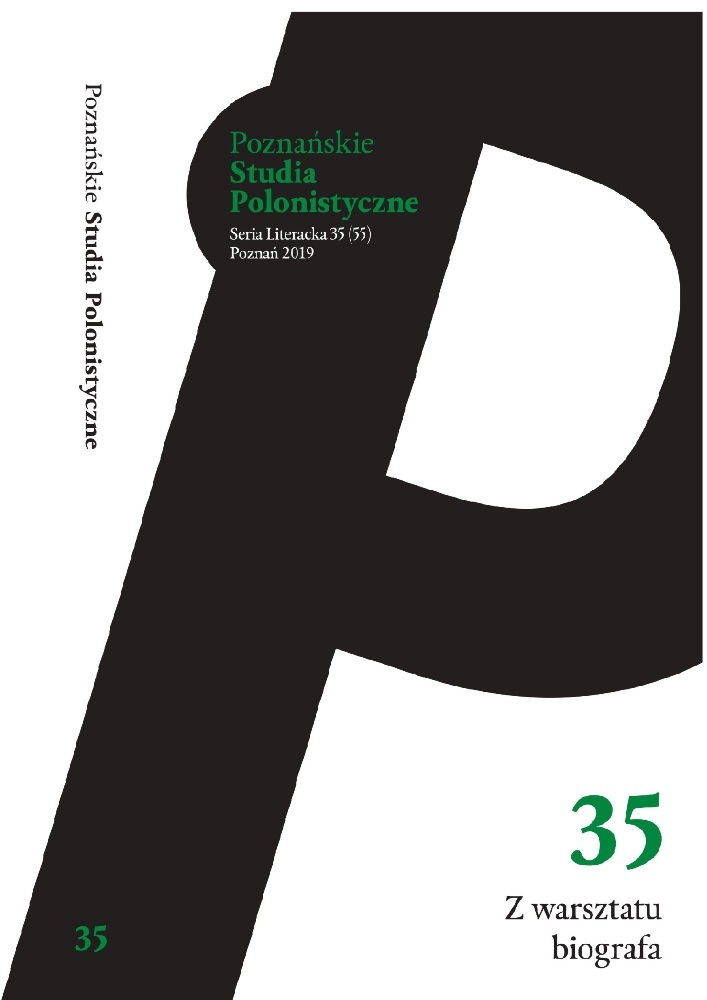Abstrakt
Perversions of the archive In the article, the author discusses the problematic status of an archival document,
taking into account the concepts of perverse historiography and the methodological indicators of the apartheid archive. Documents stored in IPN (Institute of National Remembrance) have been used to show the challenges faced by the people investigating the documents stored there and attempting to unify the material found in the archive. The analysis of Autor Solaris, a 2016 biographical documentary film about Stanisław Lem, is preceded by reflections on the involvement of the archive researchers in politics and their reproductions of clichés and stereotypes about the past, which the author sees as directly leading to blurring and erasing of the victims’ testimonies. In doing so, the author uses critical analyses of the pornographic aspects of the presentation of mass murder victims. Relating to a concept proposed by one of the critics indicating that using archival sources in modern art leads to a mass amnesia, the author points to the dangers of using Nazi propaganda films in contemporary documentary film.
Bibliografia
Aldrich Robert, red. (2009), Geje i lesbijki. Życie i kultura, przeł. Piotr Nowakowski, Universitas, Kraków.
Autor Solaris (2018), [online], [dostęp: 15 kwietnia 2019], https://www.filmweb.pl/film/Autor+Solaris-2016-774662/descs.
Leezenberg Michiel (2012), Book reviews: ‘The Historiographic Perversion’, „Journal of Genocide Research”, vol. 14, s. 244-247.
Lem Stanisław (2013), List z 7 grudnia 1972 roku, w: Stanisław Lem, Tomasz Lem, Sława i fortuna. Listy do Michaela Kandla 1972-1987, przeł. Jerzy Jastrzębski, Wydawnictwo Literackie, Kraków, s. 109-115.
Leśniak Andrzej (2011), Gorączka archiwów w sztuce współczesnej.
Symptomy choroby i propozycja terapii, „Kultura Współczesna”, nr 4 (70), s. 100-107.
Marzec Lucyna (2017), W archiwum prywatnym, „Czas Kultury”, nr 2, s. 6-15.
Moosa Fathima (2011), In the Apartheid Archives: From Perversion to Paradox. Commentary on Paper by Gillian Straker, „Psychoanalytic Dialogues”, nr 21, s. 664-669.
Mosse George L. (1997), Nationalism and Sexuality: Respectability and Abnormal Sexuality in Modern Europe, Howard Fertig, New York [USA].
Napiórkowski Marcin (2011), Prawda archiwów, „Kultura Współczesna”, nr 4, s. 12-25.
Nichanian Marc (2009), The Historiographic Perversion, przeł. Gil Anidjar, Columbia University Press, New York [USA].
Pollack Martin (2014), Skażone krajobrazy, przeł. Karolina Niedenthal, Wydawnictwo Czarne, Wołowiec.
Tymczyszyn Agata (2009), Jacques Lacan. Pragnienie Innego, „Psychoterapia”, nr 3 (150), s. 9-19.
Ulicka Danuta (2010), Zwrot archiwalny (jak ja go widzę), „Teksty Drugie”, nr 1-2, s. 159-164.
Licencja
Autorzy
Autorzy tekstów przyjętych do publikacji w czasopiśmie „Poznańskie Studia Polonistyczne. Seria Literacka” są zobowiązani do wypełnienia, podpisania i odesłania na adres redakcji umowy o udzielenie nieodpłatnej licencji do utworów, z zobowiązaniem do udzielania sublicencji CC.
Zgodnie z umową, autorzy tekstów opublikowanych w czasopiśmie „Poznańskie Studia Polonistyczne. Seria Literacka” udzielają Uniwersytetowi im. Adama Mickiewicza w Poznaniu niewyłącznej i nieodpłatnej licencji oraz zezwalają na użycie sublicencji Creative Commons Attribution-NoDerivatives 4.0 International (CC BY-ND 4.0).
Autorzy zachowują prawa do dalszego, swobodnego rozporządzania utworem.
Użytkownicy
Zainteresowani użytkownicy internetu uprawnieni są do korzystania z utworów opublikowanych od 2016 roku w „Poznańskich Studiach Polonistycznych. Serii Literackiej” pod następującymi warunkami:
- uznanie autorstwa – obowiązek podania wraz z rozpowszechnionym utworem, informacji, o autorstwie, tytule, źródle (odnośniki do oryginalnego utworu, DOI) oraz samej licencji;
- bez tworzenia utworów zależnych – utwór musi być zachowany w oryginalnej postaci, nie można bez zgody twórcy rozpowszechniać np. tłumaczeń, opracowań.
Do wszystkich tekstów opublikowanych przed 2016 r. prawa autorskie są zastrzeżone.
Inne
Uniwersytet im. Adama Mickiewicza w Poznaniu zachowuje prawo do czasopisma jako całości (układ, forma graficzna, tytuł, projekt okładki, logo itp.).
